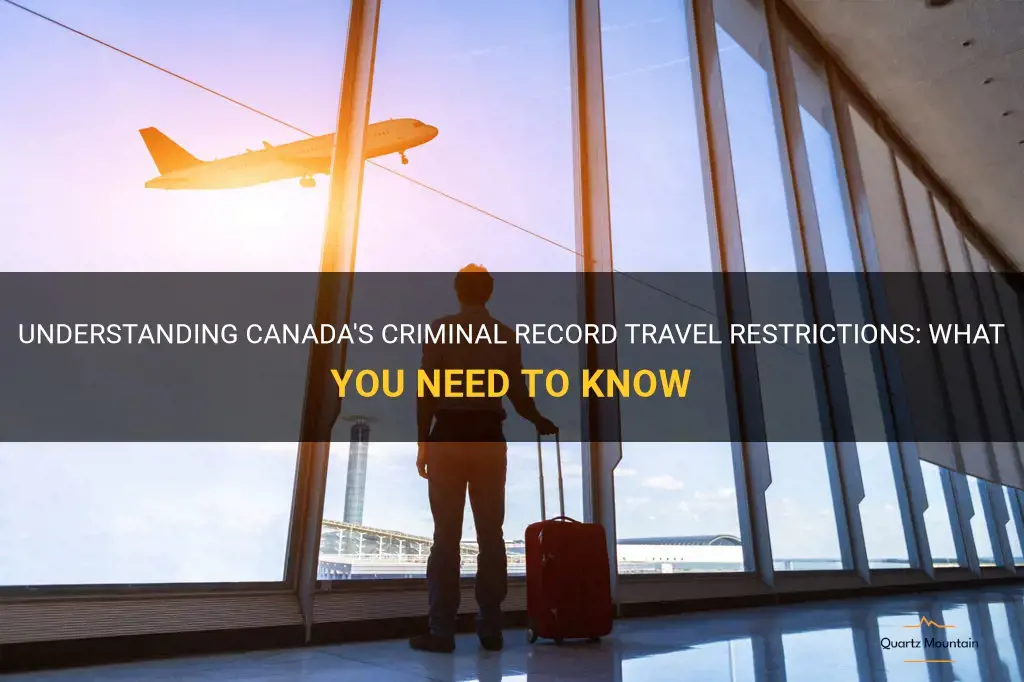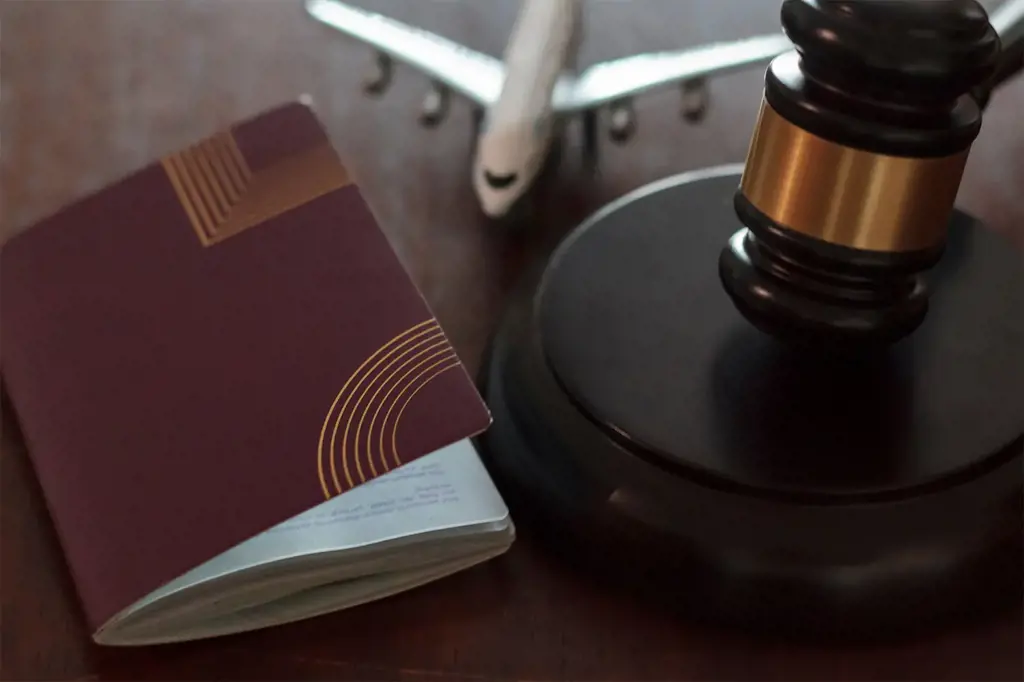
Have you ever wondered about the travel restrictions for people with a criminal record? Well, today we're going to delve into the fascinating world of Canada's criminal record travel restrictions. Canada, like many other countries, has strict policies in place to protect its borders and ensure the safety of its citizens. These policies extend to individuals with a criminal record who wish to enter the country, creating a complex web of rules and regulations. Join me as we explore the ins and outs of Canada's criminal record travel restrictions and their impact on individuals seeking to visit the Great White North.
What You'll Learn
- What are the travel restrictions for individuals with a criminal record in Canada?
- How does having a criminal record affect someone's ability to travel to Canada?
- Are there any exceptions to the travel restrictions for individuals with a criminal record in Canada?
- Can someone with a criminal record get a temporary visa to travel to Canada?
- How long does a criminal record affect someone's ability to travel to Canada?

What are the travel restrictions for individuals with a criminal record in Canada?

If you have a criminal record and are planning to travel to Canada, it's important to be aware of the travel restrictions that may be in place. Canada has strict rules for individuals with a criminal record, and entry can be denied or restricted for certain offenses. Here's what you need to know about the travel restrictions for individuals with a criminal record in Canada.
The Canadian government takes the safety and security of its citizens and visitors seriously. As a result, individuals with certain criminal records may be considered inadmissible to Canada. This means that they are not allowed to enter, or if they are already in Canada, they may be asked to leave.
There are two types of criminal offenses that can make an individual inadmissible to Canada: summary offenses and indictable offenses. Summary offenses, also known as misdemeanors in some countries, generally have a maximum sentence of less than six months. Indictable offenses, on the other hand, are more serious and can carry longer sentences.
If you have been convicted of a summary offense, you may be considered rehabilitated after a certain period of time has passed. This means that you may be able to enter Canada without any issues. The period of time depends on the offense, with some offenses requiring a waiting period of five years, while others may have a waiting period of ten years.
If you have been convicted of an indictable offense, you may not be considered rehabilitated and may require special permission to enter Canada. To be eligible for this permission, you must apply for a Temporary Resident Permit (TRP) or Criminal Rehabilitation. A TRP allows you to enter Canada for a specific period of time, while Criminal Rehabilitation permanently removes the inadmissibility associated with your criminal record.
To apply for a TRP or Criminal Rehabilitation, you will need to provide various documents and information, such as your criminal record, court documents, and a detailed explanation of why you should be allowed to enter or stay in Canada. The application process can be complex and time-consuming, so it's highly recommended to seek the assistance of an immigration lawyer or consultant.
It's important to note that even if you have received a pardon or suspension of your criminal record in your home country, it may not be recognized by the Canadian government. Canada has its own rules and standards for evaluating criminal records, and a pardon or suspension does not automatically grant you entry into the country.
In addition to the above restrictions, individuals with a criminal record may also face challenges when it comes to employment opportunities, renting a home, or obtaining certain licenses and permits in Canada.
If you have a criminal record and are planning to travel to Canada, it's crucial to do your research and understand the travel restrictions that may apply to you. Consulting with an immigration professional can help ensure that you have all the necessary information and guidance to navigate the process successfully.
Understanding the SL6 Green Card Travel Restrictions and Implications
You may want to see also

How does having a criminal record affect someone's ability to travel to Canada?

Having a criminal record can have significant implications on a person's ability to travel to Canada. The Canadian government takes matters of criminality seriously and has strict regulations in place to ensure the safety and security of its citizens and visitors. Travelers with a criminal record must navigate specific procedures and requirements in order to gain entry into the country.
Canada considers any criminal offense, regardless of severity or how long ago it occurred, as grounds for inadmissibility. This means that individuals with a criminal record may be denied entry to Canada, even if their offense was minor or occurred many years ago. It is crucial to understand that once a pardon or expungement is obtained in another country, it does not automatically guarantee entry into Canada.
The first step for individuals with a criminal record who wish to travel to Canada is to determine if they are inadmissible. This can be done by contacting the nearest Canadian embassy or consulate. It is important to provide accurate and detailed information about the offense committed, including dates, charges, and any documentation available.
If the offense is considered serious, such as those involving violence, firearms, or drug trafficking, individuals may be permanently inadmissible to Canada. However, individuals with less serious offenses may be eligible to apply for Criminal Rehabilitation or a Temporary Resident Permit (TRP), depending on the circumstances.
Criminal Rehabilitation is a formal process that allows individuals with a criminal record to demonstrate that they have been rehabilitated and are no longer a risk to Canadian society. To be eligible, at least five years must have passed since the completion of all criminal sentences, including probation and parole. It is important to note that individuals can only apply for Criminal Rehabilitation once, and it is a permanent solution.
A Temporary Resident Permit (TRP) is an option for individuals who need to travel to Canada for a specific reason, such as business or family matters, and have not yet met the five-year waiting period for Criminal Rehabilitation. A TRP allows individuals to enter Canada temporarily, but it is generally granted for a limited time and for a specific purpose.
When applying for Criminal Rehabilitation or a TRP, individuals must provide a complete and accurate application package, including supporting documents such as court records, character references, and rehabilitation evidence. It is highly recommended to seek the assistance of an immigration lawyer or consultant with experience in criminal inadmissibility to navigate this complex process.
It is important to note that even if individuals successfully obtain Criminal Rehabilitation or a TRP, they may still be subject to additional screening upon arrival in Canada. Canadian border officials have the authority to deny entry to anyone they believe poses a threat to the safety and security of the country.
In summary, having a criminal record can significantly affect a person's ability to travel to Canada. The Canadian government takes criminal inadmissibility seriously and individuals with a criminal record must navigate specific procedures and requirements to gain entry. It is crucial to seek professional advice and understand the options available in order to increase the chances of a successful trip to Canada.
Navigating the Rhode Island Travel Restrictions: What You Need to Know
You may want to see also

Are there any exceptions to the travel restrictions for individuals with a criminal record in Canada?

If you have a criminal record in Canada, you may be wondering if there are any exceptions to the country's travel restrictions. The answer to this question is not as straightforward as you may think. While there are some exceptions to the travel restrictions for individuals with a criminal record, they are limited and come with certain requirements.
Firstly, it's important to note that Canada has strict rules and regulations when it comes to individuals with a criminal record entering the country. If you have been convicted of a crime, even if it was many years ago, you may be deemed inadmissible to Canada. This means that you may not be allowed to enter the country unless you are granted an exception.
One exception to the travel restrictions for individuals with a criminal record is a Temporary Resident Permit (TRP). This permit is issued by the Government of Canada and allows individuals who would otherwise be inadmissible to enter the country for a specific purpose and for a limited period of time. In order to be eligible for a TRP, you must demonstrate that you have a valid reason for entering Canada and that you pose no risk to Canadian society. You will also need to provide supporting documentation, such as a letter of invitation, proof of employment, and a detailed explanation of why you need to enter Canada.
Another exception is Criminal Rehabilitation. This process allows individuals with a criminal record to become admissible to Canada permanently. To be eligible for Criminal Rehabilitation, you must have completed your sentence at least five years ago and demonstrate that you are rehabilitated and unlikely to commit another crime. This can be a lengthy and complex process, requiring extensive documentation and evidence.
It's important to note that even if you qualify for a TRP or Criminal Rehabilitation, there is no guarantee that you will be granted entry into Canada. The final decision rests with the immigration officer at the port of entry, who will consider various factors such as the seriousness of your crime, the length of time since the offense, and your behavior since then.
In conclusion, while there are some exceptions to the travel restrictions for individuals with a criminal record in Canada, they are limited and come with certain requirements. If you have a criminal record and wish to travel to Canada, it is recommended that you consult with an immigration lawyer to understand your options and increase your chances of being granted entry.
Understanding Air Travel Restrictions in Arizona: What You Need to Know
You may want to see also

Can someone with a criminal record get a temporary visa to travel to Canada?

Traveling to another country can be an exciting and enriching experience. However, for individuals with a criminal record, it may raise concerns about whether they can obtain a temporary visa to travel to Canada. Canada has strict rules and regulations regarding entry into the country for individuals with criminal records. This article aims to provide an overview of the processes and considerations involved in obtaining a temporary visa to travel to Canada with a criminal record.
Firstly, it is essential to understand that having a criminal record does not automatically disqualify someone from obtaining a temporary visa to Canada. The Canadian government assesses each case individually and considers various factors, including the nature and severity of the offense, the length of time since the offense was committed, and the applicant's overall intentions for visiting Canada.
The primary concern for the Canadian government is ensuring the safety and security of its citizens and residents. Therefore, individuals with serious criminal offenses, such as those involving violence or drug trafficking, may face more significant challenges in obtaining a temporary visa. However, it is still possible to apply, and each case will be reviewed on its own merits.
The Canadian government utilizes two main processes for assessing temporary visa applications from individuals with criminal records: Criminal Rehabilitation and Temporary Resident Permit (TRP).
- Criminal Rehabilitation: This process is available for individuals who have completed their criminal sentence, including the payment of fines or completion of probation. The individual must demonstrate that they have been rehabilitated and no longer pose a threat to Canadian society. The application involves submitting supporting documents, such as court records, character references, and a personal statement outlining the rehabilitation efforts and changes made since the offense was committed. The approval process can take several months, so it is crucial to apply well in advance of any planned travel.
- Temporary Resident Permit (TRP): Individuals who are still inadmissible to Canada due to their criminal record may be eligible for a TRP, which grants temporary entry for a specific period. A TRP is typically issued for compelling reasons that outweigh any potential risks associated with the individual's criminal background. Valid reasons may include business meetings, family events, or educational opportunities. The application requires providing a detailed explanation of the travel purpose, supporting documents, and a thorough explanation of why the individual should be granted entry despite their criminal record.
It is important to note that obtaining a temporary visa with a criminal record is not guaranteed, and each application will be assessed individually. Consulting with an immigration lawyer or a qualified immigration consultant experienced in dealing with criminal inadmissibility cases can be beneficial in navigating the complex process and ensuring the best possible chance of success.
In summary, individuals with a criminal record can potentially obtain a temporary visa to travel to Canada, but it is essential to understand and comply with the Canadian government's rules and processes. Criminal Rehabilitation and Temporary Resident Permit are two avenues that can be pursued, although success is not guaranteed. Consulting with an immigration professional will provide guidance and assistance in maximizing the chances of a positive outcome.
Air France Travel Restrictions: What You Need to Know During the Pandemic
You may want to see also

How long does a criminal record affect someone's ability to travel to Canada?

Traveling to another country can be an exciting experience, but for individuals with a criminal record, it can also be a complicated one. When it comes to entering Canada, having a criminal record can affect a person's ability to enter the country and may result in being denied entry or being deported. The length of time a criminal record affects someone's ability to travel to Canada depends on various factors.
Canada has strict rules and regulations when it comes to individuals with criminal records entering the country. The Canadian government is committed to protecting the safety and security of its citizens and aims to prevent individuals with criminal backgrounds from entering the country. As a result, certain criminal offenses can make a person inadmissible to Canada.
The length of time a criminal record affects someone's ability to travel to Canada is determined by the seriousness of the offense and how much time has passed since the completion of the sentence. Generally, individuals who have been convicted of serious crimes, such as murder, sexual assault, or drug trafficking, may be permanently inadmissible to Canada. Others with less serious offenses may be subject to a specific period during which they are considered inadmissible.
For individuals who have committed a less serious offense, such as a DUI or theft under a certain amount, there is a waiting period before they are considered admissible to Canada. The length of this waiting period varies depending on the offense committed. For example, a DUI conviction can make a person inadmissible to Canada for up to 10 years from the date of completion of their sentence. However, it's important to note that even after this waiting period, individuals may still require special permission or waivers to enter the country.
It's worth mentioning that not all crimes make a person inadmissible to Canada, and there are certain circumstances where individuals may be deemed rehabilitated after a certain period of time. Rehabilitation means that an individual has shown a demonstrable change in behavior and is unlikely to reoffend. In these cases, individuals may be eligible to visit Canada without any issues.
To determine the admissibility of individuals with a criminal record, Canadian immigration officials will assess several factors, including the nature of the offense, the length of time since the offense was committed, the sentence imposed, and any subsequent criminal activity. Individuals with criminal records who wish to travel to Canada are encouraged to consult with an immigration lawyer or seek advice from the Canadian consulate or embassy in their country to fully understand their admissibility and any potential remedies.
In conclusion, a criminal record can affect someone's ability to travel to Canada for a varying period of time, depending on the offense committed. Serious crimes may result in permanent inadmissibility, while less serious offenses may have a waiting period before a person is considered admissible. It is important for individuals with a criminal record to seek professional advice to fully understand their options and potential remedies for visiting Canada.
Navigating Alaska's Travel Quarantine Restrictions: What You Need to Know
You may want to see also
Frequently asked questions
It depends on the nature of the criminal offense. Some criminal offenses may make you ineligible to enter Canada. However, there are certain circumstances where you may be allowed to travel if you have a criminal record.
In Canada, criminal offenses such as assault, DUI, drug charges, theft, and fraud can all be considered grounds for inadmissibility. If you have been convicted of any of these offenses, you may be denied entry to Canada.
If your criminal record has been expunged or you have been granted a pardon, you may still be required to obtain a Temporary Resident Permit (TRP) in order to enter Canada. The Canadian immigration authorities will assess your application and determine if you are admissible based on the details of your case.
Yes, if you are ineligible to enter Canada due to a prior criminal offense, you may be able to apply for rehabilitation to remove the travel restriction. Rehabilitation is a formal process where you demonstrate that you have reformed and are no longer a risk to Canadian society. If your application is approved, you will no longer be subject to the criminal record travel restriction.







